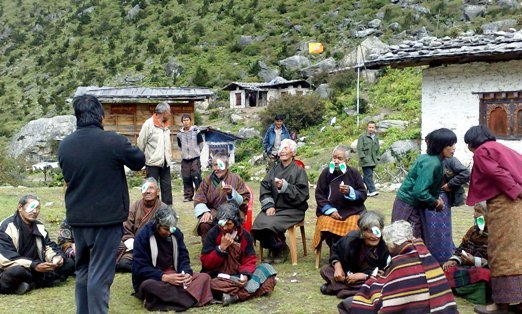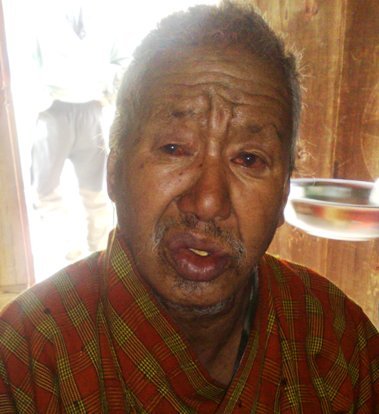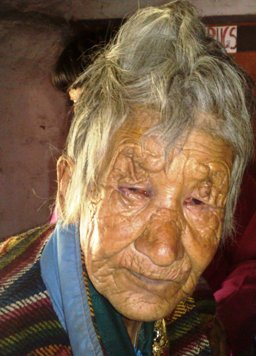By Marie A. Gakuba | Program Coordinator
Lunana is located on the bank of the Pho Chu River and it is the most remote region in Bhutan. It takes ten days walk from the nearest road and eight days from the district Headquarters. Lunana is made up of dispersed settlement with 150 households. Cold and harsh climate pervades throughout the year, with altitudes ranging from 7000 to over 8000 feet above sea level and mule tracks are the only access.
Lunana’s facilities, which include a school, a health center, and a livestock extension center, remain open from June to September and close by mid October due to heavy snowfall. Most of the people also migrate to lower nearby districts in search of manual work and also for barter trade with their yak products with necessary items like chilly, rice and others.
Before setting out for the outreach camp (OMEC), the team had to make additional preparations due to weather conditions as well as the geographical location of Lunana. Prior to the their departure, they made sure all the drugs and non-drugs items including the operating microscope were packed properly to ensure that they were small, portable and most importantly waterproof.
The ophthalmic team that set out for the OMEC consisted of one ophthalmologist and 3 ophthalmic technicians. The team left on the 10th August. Traveling in monsoon season brings many problems due to incessant rains leading to landslides, washed away bridges, falling boulders, and so on. After a day of travel, the team spent a day in the village of Damji where they provided eye care services to more than 100 patients.
On the third day of the journey, the team proceeded to halt at the base of mount Kangla Karchu to enable the crossing of the pass the following day. From there on, there was no downhill journey and the team climbed up hills after hills at high altitude. Traveling through incessant rains and winds in muddy and slippery stones took a toll on the travelers as well as the horses carrying the loads.
Late that evening the team arrived at a campsite where tents were pitched and arrangements made for the evening. That night, the ophthalmologist developed severe chest pain, and breathlessness, giddiness, headache nausea and vomiting and his condition further deteriorated the next day. The team decided to halt there for one day to give him time for acclimatization and at the same time stabilize his condition.
That evening, the doctor also showed sign of dehydration and general weakness. Due to difficult terrains, lack of communication, and adequate medical aids, a decision was made to transfer him back that night. While an attempt was made to travel on horse, it was not possible due to poor visibility, lack of strength to ride on horse and due to poor trail condition. The return mission was abandoned.
With intensive medications over the night and nourishing porridge, and glucose water, his condition showed improvement by sunrise. Weighing the pros and cons, he determined to proceed further. However, much of the remaining trip had to be made on horse. Upon the arrival of the team members and the medical loads, preparations were done for conducting the clinics. The operation theatre was set up with plastic sheets and fumigation.
More than 100 patients received treatment in Lunana and all school children were thoroughly evaluated for any ophthalmic problems. Those requiring vision restoring surgery were listed and received counseling while preoperative preparations were being done. A total of 18 patients received. All operations went successfully and the post-operative period was uneventful. Medications were explained and handed over to the patients with detailed instructions.
One of the aims of the trip was to follow-up on a corneal transplant patient. She had permanently lost her right eye years back from corneal trauma and ulceration. It had taken her relatives more than 10 days to carry her from Lunana to Jigme Dorji Wangchuck National Referral Hospital in Thimphu, Bhutan. Due to lack of cornea, she had to stay in the hospital for more than two months before her operation. She regained her vision and she is happily tending to yaks now. At the follow-up, she was all smiles and with deep gratitude. She was very careful and understood the importance of timely medications and follow-ups. She had functional vision and her transplant had remained clear. Her medicines were refilled and she was advised to return to the hospital for a detailed assessment.
The team’s return journey proved to be very challenging. With one bridge washed away a detour had to be made to cross a lone log bridge. Climbing the slippery cliff and reaching the log bridge proved to be very demanding and at times life threatening endeavor. After facing many difficult situations and overcoming each, the team, all returned safe and sound.
Project reports on GlobalGiving are posted directly to globalgiving.org by Project Leaders as they are completed, generally every 3-4 months. To protect the integrity of these documents, GlobalGiving does not alter them; therefore you may find some language or formatting issues.
If you donate to this project or have donated to this project, you can receive an email when this project posts a report. You can also subscribe for reports without donating.
Support this important cause by creating a personalized fundraising page.
Start a Fundraiser







